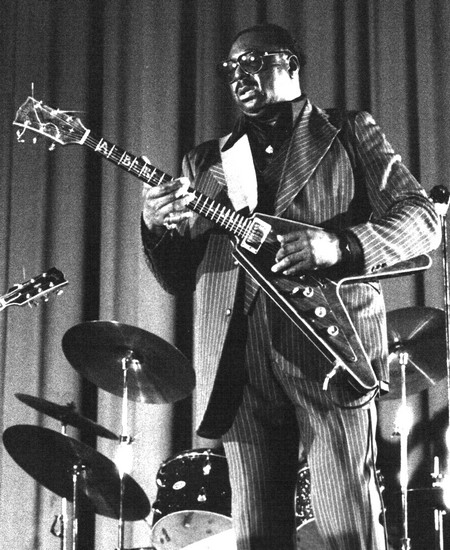
Albert King
Albert Nelson (April 25, 1923 – December 21, 1992), known by his stage name Albert King, was an American guitarist and singer who is often regarded as one of the greatest and most influential blues guitarists of all time.[2][3][4][5] He is perhaps best known for his popular and influential album Born Under a Bad Sign (1967) and its title track. He, B.B. King, and Freddie King, all unrelated, were known as the "Kings of the Blues".[6] The left-handed Albert King was known for his "deep, dramatic sound that was widely imitated by both blues and rock guitarists".[7]
For other people named Albert King, see Albert King (disambiguation).
He was once nicknamed "The Velvet Bulldozer" because of his smooth singing and large size – he stood taller than average, with sources reporting 6 ft 4 in (1.93 m) or 6 ft 7 in (2.01 m), and weighed 250 lb (110 kg) – and also because he drove a bulldozer in one of his day jobs early in his career.[8][9]
King was inducted into the Blues Hall of Fame in 1983. He was posthumously inducted into the Rock and Roll Hall of Fame in 2013. In 2023, he was ranked number 22 on Rolling Stone's 250 Greatest Guitarists of All Time.[10]
Early life[edit]
Albert King was born on a cotton plantation in Indianola, Mississippi. During childhood he sang at a church with a family gospel group, in which his father played the guitar. One of 13 children, he grew up picking cotton on plantations near Forrest City, Arkansas, where the family moved when he was eight years old.[7]
King's identity was a longtime source of confusion. He stated in interviews that he was born in Indianola on April 25, 1923 (or 1924), and was a half-brother of B.B. King (whose hometown was Indianola), but documentation suggests otherwise. King stated that whenever he performed at Club Ebony in Indianola, the event was celebrated as a homecoming, and he cited the fact that B.B.'s father was named Albert King.[7] However, when he applied for a Social Security card in 1942, he gave his birthplace as "Aboden" (most likely Aberdeen, Mississippi) and signed his name as Albert Nelson, listing his father as Will Nelson.[7] Musicians also knew him as Albert Nelson in the 1940s and early 1950s.
He started using the name Albert King in 1953 as an attempt to be associated with B.B King; he was billed as "B.B. King's brother".[7] He also used the same nickname as B.B King, "Blues Boy", and he named his guitar "Lucy" (B.B. King's guitar was named "Lucille").[7] B.B. King later said: "He called his guitar 'Lucy,' and for a while he went around saying he was my brother. That bothered me until I got to know him and realized he was right; he wasn't my brother in blood, but he sure was my brother in the blues."[11]
According to King, his father left the family when Albert was five, and when he was eight he moved with his mother, Mary Blevins, and two sisters to an area near Forrest City, Arkansas.[9] He said his family had also lived in Arcola, Mississippi, for a time. He made his first guitar out of a cigar box, a piece of a bush, and a strand of broom wire. He later bought a real guitar for $1.25.[9] As a left-hander learning guitar on his own, he turned his guitar upside down. He picked cotton, drove a bulldozer, worked in construction, and held other jobs until he was able to support himself as a musician.[7]
Death[edit]
King died of a heart attack on December 21, 1992, in his Memphis home.[15] His final concert had been in Los Angeles two days earlier. He was given a funeral procession with the Memphis Horns playing "When the Saints Go Marching In" and was buried in Paradise Gardens Cemetery in Edmondson, Arkansas, near his childhood home.[29]
King was survived by his wife, Glendle; two daughters, Evelyn Smith and Gloria Randolph; a son, Donald Randolph; a sister, Elvie Wells; eight grandchildren, and ten great-grandchildren.[15]
Accolades[edit]
Over the course of his career, King was nominated for two Grammy awards. In 1983, he was nominated for Best Traditional Blues album for San Francisco '83 and the next year he was also nominated for I'm In A Phone Booth, Baby.[27]
In 1983, King was inducted into the Blues Hall of Fame.[7] He received a star on the St. Louis Walk of Fame in 1993.[35] In 2011, King was honored with a marker on the Mississippi Blues Trail in his hometown Indianola.[7][36] He was inducted into the Memphis Music Hall of Fame in 2013.[9]
King was inducted into the Rock and Roll Hall of Fame in 2013.[37] At the induction ceremony, Gary Clark Jr. performed King's "Oh, Pretty Woman" and was then joined by John Mayer and Booker T. Jones to perform King's "Born Under a Bad Sign".[38]